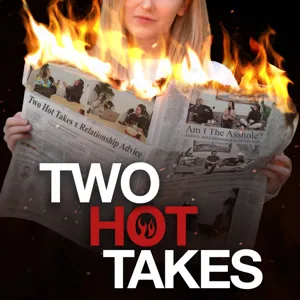Podcast Summary
The Psychology of Chronic Oversharing in Our Twenties: Understanding the reasons behind our impulse to overshare can help us set boundaries and maintain healthier relationships, reducing regret and feelings of inadequacy.
Chronic oversharing is a common experience in our twenties and has psychological underpinnings. We often feel the impulse to share too much information with others, even when we know we shouldn't or don't want to. This can stem from social anxiety, lowered impulse control, neurodivergence, or a desire to feel more interesting or connected. Oversharing can lead to regret and embarrassment, causing negative self-talk and feelings of inadequacy. However, it's important to remember that the impact of oversharing on others is secondary to how it makes us feel about ourselves. Identifying the line between vulnerability and oversharing and setting boundaries can help prevent us from disclosing more than we're comfortable with and maintain healthier relationships.
Balancing Authenticity and Privacy: Authenticity is about being true to ourselves, but it's important to find a balance between sharing personal details for connection and keeping certain aspects private.
There is a fine line between oversharing and being authentic. As humans, we often use personal stories and disclosure to build connections and show our true selves. However, it's important to be mindful of what should be kept private and what can be shared with different audiences. Authenticity comes from a place of honesty and being true to ourselves, regardless of societal pressures. Sharing personal details can create relatability and a sense of closeness, making others feel less alone. Our society has become more accepting of discussing taboo topics and being vulnerable with each other. However, it's crucial to differentiate between honest sharing and sharing excessive and inappropriate details. Using vulnerability as a tool is not the same as truly being vulnerable.
The Consequences of Oversharing on Social Media and with Acquaintances: Oversharing online or with acquaintances can lead to a lack of privacy, an addiction to validation, the betrayal of trust, and strained relationships. Be mindful of trauma dumping and consider your audience before sharing.
Oversharing on social media or with acquaintances can have serious consequences for both yourself and the people involved. It may lead to a lack of personal online privacy and an addiction to validation from strangers. Additionally, oversharing intimate details of your relationships can betray the trust of your partner or loved ones. Chronic oversharing can make you less approachable and uncomfortable for those around you, potentially resulting in social exclusion or strained relationships. It is important to be mindful of trauma dumping, unloading traumatic experiences on others without invitation, as it can cause vicarious trauma and trigger individuals. While sharing can be healing, it is crucial to consider your audience and the appropriateness of the context before oversharing.
The impact of oversharing and how to prevent it: Being mindful of the information we disclose and understanding the reasons behind oversharing can help prevent discomfort, regret, and vulnerability hangovers, leading to healthier relationships.
Oversharing can lead to discomfort and regret. It's important to be mindful of the information we disclose and consider the impact it may have on others. We all have a natural instinct to maintain a balance between building social connections and preserving our personal boundaries. When we overshare, we may experience what is known as a vulnerability hangover, which includes feelings of anxiety, shame, and regret. Our brain acts as a regulator, reminding us when we may have crossed the line of social acceptability. Despite this internal system, some individuals are chronic oversharers due to various psychological reasons, such as seeking emotional regulation, coping with social anxiety or ADHD, or craving attention. By understanding these underlying reasons and implementing strategies to prevent oversharing, we can avoid the intense vulnerability hangover and maintain healthier relationships.
The reasons behind oversharing and its potential consequences.: Oversharing can be a coping mechanism, but relying on strangers or substances may only provide short-term relief and lead to uneasiness. Social anxiety and ADHD can also contribute to oversharing behavior.
Oversharing can be a coping mechanism for when our thoughts become overwhelming or when we feel the need to lessen the burden on our minds. Externalizing our thoughts by confiding in someone we trust can help alleviate the intensity of our experiences and make us feel refreshed. However, relying on strangers for emotional regulation may provide only short-term relief and leave us feeling uneasy. Another reason for chronic oversharing is social anxiety, which can lead to impulsively revealing personal details in an attempt to manage awkwardness or gain approval. Alcohol can also contribute to oversharing by lowering inhibitions and impairing judgment. Additionally, adults with ADHD may unintentionally engage in oversharing due to difficulty reading social cues.
Understanding the Reasons for Oversharing: Oversharing can be caused by factors like ADHD, the need for fast-tracked relationships, fear of abandonment, and seeking attention. However, it's important to recognize that true emotional bonds require more than just surface-level disclosure.
Oversharing can be attributed to various factors such as ADHD, the desire for fast-tracked relationships, fear of abandonment, and seeking attention or sympathy. When individuals have ADHD, their ability to control impulses and make appropriate decisions is hindered due to the decreased functionality of the part of the brain responsible for executive function skills. Oversharing can also stem from a desire to quickly establish intimacy and closeness by disclosing personal details, often driven by the intensity addiction and emotional attachment styles. Additionally, some people may unknowingly associate oversharing with gaining attention or validation, as others are naturally curious about uncommon topics. However, it is important to recognize that not everything needs to be shared to feel important or validated, as true emotional bonds require more than just surface-level disclosure.
The importance of context and trust when sharing personal experiences, and the dangers of chronic oversharing.: Be mindful of when and with whom you share personal experiences, seek support from trusted individuals, and find ways to redirect the urge to overshare into productive outlets. Focus on prioritizing your own well-being over seeking external validation.
Sharing personal experiences can have both positive and negative consequences. While it's important to be open and honest with ourselves and others, context and relationship are key in determining when and with whom it is appropriate to share. Externalizing certain events to process them is okay, but it should be done with someone we trust and who can provide the support we need. It's also important to regulate the habit of oversharing, especially if it becomes chronic and uncontrollable. Tips for doing so include redirecting the conversation to the other person, being an active listener, figuring out triggers for oversharing, and channeling the urge into productive outlets like journaling. Ultimately, it's important to prioritize our own well-being and not rely on external validation.
Navigating the Balance of Oversharing and Alcohol in Social Settings: To maintain a healthy relationship with oversharing and alcohol, view oversharing as an opportunity for growth and reflection, be mindful of alcohol consumption, and handle vulnerability hangovers by processing feelings privately or confiding in a trusted friend.
It's important to create a healthy relationship with oversharing and alcohol in social settings. Rather than seeing oversharing as something shameful or taboo, we should view it as an opportunity for productive expression and self-reflection. However, it's crucial to be mindful of our alcohol consumption, as it can lower inhibitions and lead to regrettable oversharing. If we find ourselves experiencing a vulnerability hangover, it's best to avoid groveling or excessively apologizing to the person we shared with. Instead, we can process our feelings on our own or confide in a close friend. Remember, everything is temporary, and most people are less likely to remember our oversharing unless we give them a reason to. So let's practice self-awareness, learn from our experiences, and work towards better control of our impulses.





